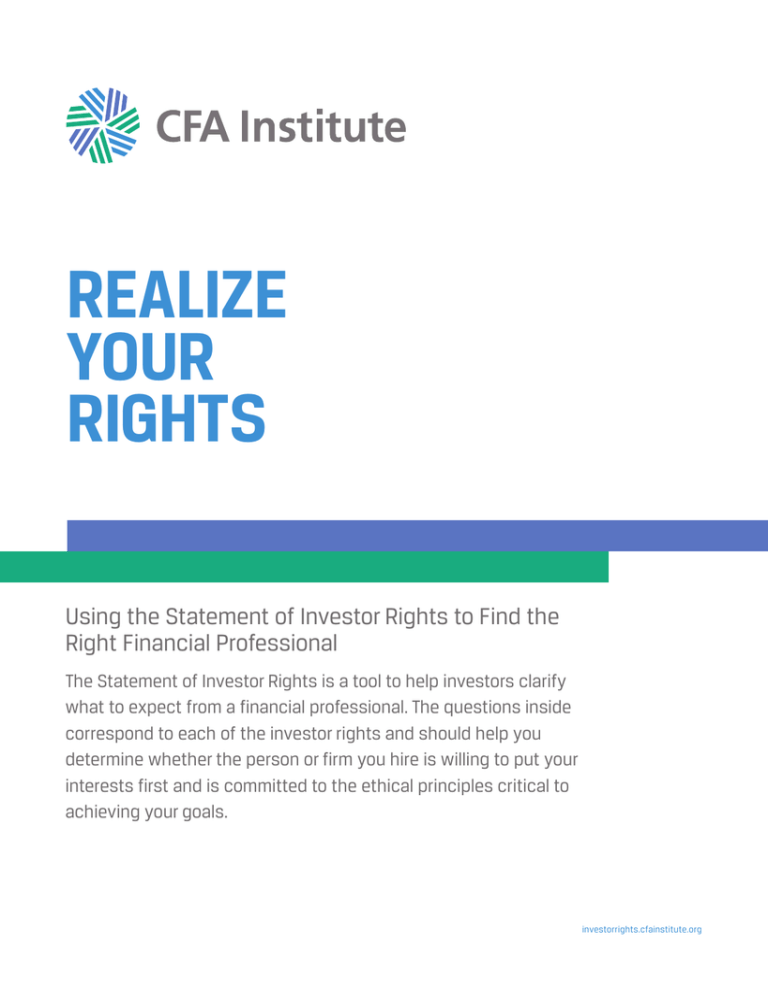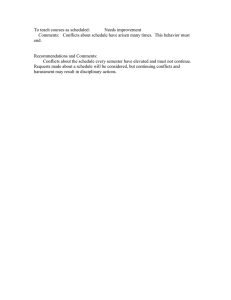
REALIZE
YOUR
RIGHTS
Using the Statement of Investor Rights to Find the
Right Financial Professional
The Statement of Investor Rights is a tool to help investors clarify
what to expect from a financial professional. The questions inside
correspond to each of the investor rights and should help you
determine whether the person or firm you hire is willing to put your
interests first and is committed to the ethical principles critical to
achieving your goals.
investorrights.cfainstitute.org
Ask These Questions
What This Means for You
1. H
onest, competent, and ethical conduct that
complies with applicable law
It is important that investors consider factors beyond
historical performance when hiring a financial professional.
Look for someone who demonstrates integrity and adheres
to professional codes and ethical standards.
• Is your practice governed by an ethical or
professional code of standards, and may I
have a copy?
• Are you and your firm familiar with and willing
to abide by the Statement of Investor Rights?
2. Independent and objective advice and
assistance based on informed analysis,
prudent judgment, and diligent effort
• Who will be working on my portfolio, and what
are their credentials and experience?
• What happens to my portfolio if you or
members of the team leave the firm?
• Can you provide me with examples of the
analysis and process you perform to arrive at
investment decisions?
3. My financial interests taking precedence
over those of the professional and the
organization
• What regulatory standard, if any, governs our
relationship?
• Are you a fiduciary, and would our relationship
be held to a fiduciary standard?
• How do you decide which investments to
recommend? Are you free to recommend
investments sponsored or managed by other
companies?
4. F air treatment with respect to other clients
• What policies are in place to make sure clients
receive fair treatment relative to each other?
• How do you ensure clients have appropriate
access to products and investment
opportunities?
• How do you make sure clients receive
adequate support and customer service,
especially during a crisis?
2
One such code is the Asset Manager Code (AMC), a
voluntary code of conduct developed by CFA Institute. The
AMC was created to help investors easily identify asset
managers who uphold an ethical foundation that promotes
transparency and resolves conflicts of interest in favor of
investors.
The key consideration is that the person or team
you have identified is careful, judicious, and diligent.
CFA® charterholders have proven their investment
knowledge and annually attest to a code of ethics and
professional standards. You should understand the firm’s
depth of expertise and what might happen if your main
contact moves to another firm.
It is important to understand the investment philosophy
and the decision-making processes of the team that you
are entrusting your money to.
Though it may not be a legal requirement in all places, you
should demand that all financial service providers put your
interests before theirs and their organizations’.
If your financial service provider is a fiduciary, generally
speaking they have a legal duty to uphold your interests
in decision making. Some financial professionals are only
required to recommend or sell you financial products that
are suitable for you, not necessarily ideal or even in your
best interest. It is important to ensure that your interests
supersede those of the financial service provider before
you make a hiring decision.
To ensure that you are treated fairly in relation to
other clients, it is important to understand how the
firm is structured to provide access to services and
communication in different market or business scenarios.
Clients’ needs are often different, so fairness does not
mean the same thing is equally relevant or appropriate for
all. However, all firms should be willing to be transparent
about any differences in client service levels while still
maintaining confidentiality.
investorrights.cfainstitute.org
Ask These Questions
What This Means for You
5. D
isclosure of any existing or potential
conflicts of interest in providing products or
services to me
It is important to realize that conflicts of interest do
come up, but the important thing is that you trust the
person you work with to handle them responsibly and
with transparency. Some conflicts of interest arise
from fee arrangements. Others result from the fact that
professionals must serve two masters: their clients and
their employer.
• What is your process for identifying and
communicating conflicts of interest?
• How are conflicts of interest addressed and
mitigated, and can you share an example?
6. An understanding of my circumstances
so that any advice provided is suitable
and based on my financial objectives and
constraints
• How do you get to know your clients and
assess their financial needs and goals?
• How do you determine whether recommended
products and services are appropriate for my
portfolio and can help me achieve my financial
goals?
• Will you provide me with a written personal
financial plan designed to fulfil my financial
needs and goals?
7. Clear, accurate, complete, and timely
communications that use plain language
and are presented in a format that conveys
the information effectively
• What means of communication (email, phone,
etc.) do you use, and how often should I
expect to hear from you?
• How often will we meet in person?
• Can you provide me with examples of reports,
performance statements, and other types of
communication I may receive from you?
3
Your finance service provider’s professional standards
and code of ethics should demand transparency in all
things, including how potential conflicts are identified,
communicated, and resolved.
Your financial objectives should drive all decision making,
including investment strategy, risk management, and
security selection. It is important that you and your
financial service provider understand your financial needs
and any constraints that could affect strategy or tactics.
Become familiar with the organization’s services and how
they match up with both your current needs and longerterm goals. Make sure that your service professional
understands your financial ability and emotional
willingness to take risk and how that is factored into your
financial plan and investment strategy.
The nature of your relationship and how clearly and
frequently your provider communicates with you matters.
Your provider should listen to your concerns and answer
your questions-this is an important foundation.
Be clear with your financial service provider about the type
of contact you are most comfortable with and establish
what you expect from them early on so there is no
miscommunication.
investorrights.cfainstitute.org
Ask These Questions
What This Means for You
8. A
n explanation of all fees and costs charged
to me and information showing these
expenses to be fair and reasonable
Clients should keep in mind that fees can (and should) be
viewed as a tool to align the manager’s and the client’s
interests.
• On what basis are you compensated: fee only,
fee based, commission, percentage of assets
under management, fixed or flat fee?
• How are the fees calculated, billed, and
collected?
• Could the proposed fee arrangements lead to
conflicts of interest?
9. Confidentiality of my information
• What is your privacy policy for client
information?
• How can you certify that my financial and
personal information is secure?
• Have you ever had information lost or stolen?
If so, how was the situation resolved?
10. A
ppropriate and complete records to
support any work done on my behalf
• How long will my records be retained at your
firm, and can I request them at any time?
• Does the firm claim compliance with the
Global Investment Performance Standards
(GIPS® standards)?
Whatever the goal or objective, the key is for clients to
understand what they are paying and be comfortable
with what they are receiving from their financial service
professionals in return for those fees.
In addition to trusting your financial service provider to
manage your portfolio appropriately, you must be confident
that your provider can safeguard any sensitive information
about you. Cybersecurity breaches are now happening
with disturbing frequency. You want to be confident that
your private information and money are secure.
One of the ways that trust is built is through clear and
transparent reporting that facilitates an open dialogue
between report preparers and users.
The GIPS standards are a voluntary set of standards
developed by CFA Institute to establish global protocols
for how companies should present their investment
performance to help investors evaluate it.
The Future of Finance is a long-term, global effort to shape a trustworthy, forward-thinking investment
profession that better serves society. To learn more, please visit www.cfainstitute.org/futurefinance.
4
investorrights.cfainstitute.org
© 2016 CFA Institute. All rights reserved.



